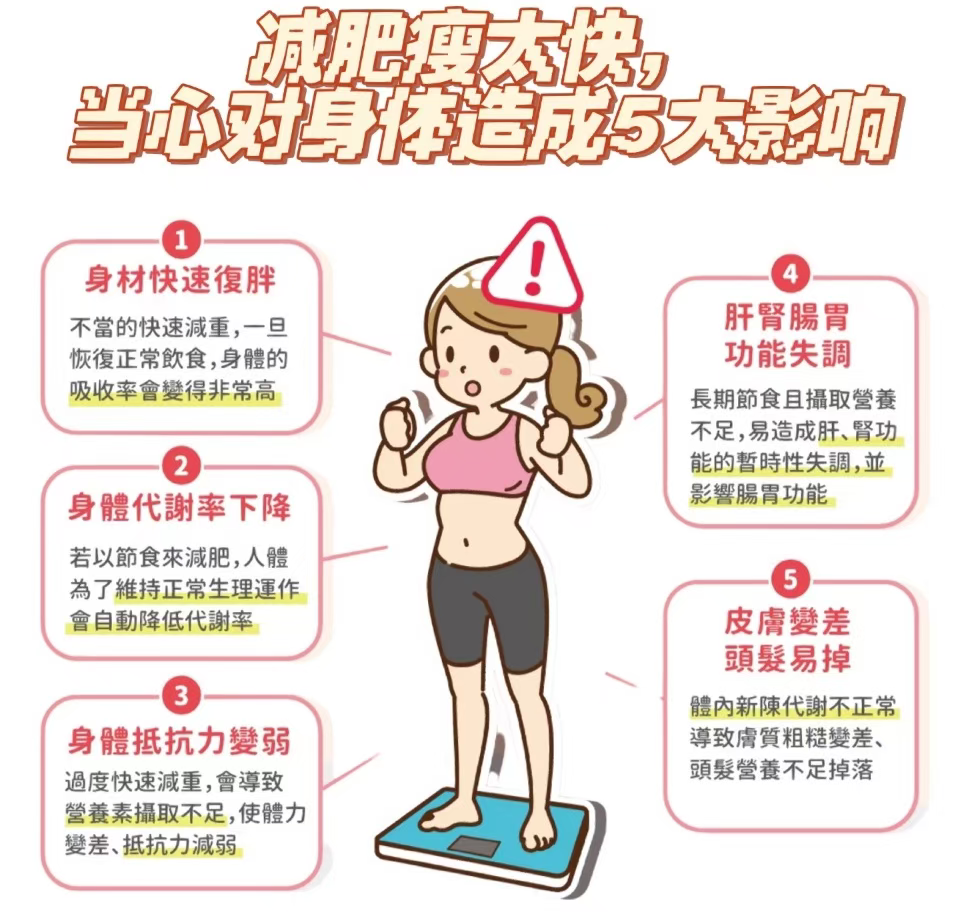Scientific Weight Management: Saying Goodbye to "Yo-Yo" Cycles and Embracing Sustainable Health
Scientific Weight Management: Saying Goodbye to "Yo-Yo" Cycles and Embracing Sustainable Health
On the journey to better health, weight management remains a perennial concern. Many embark on weight-loss journeys with unwavering resolve, only to fall into the "yo-yo" cycle—shedding pounds only to regain them, over and over. This pattern not only erodes confidence but also takes a toll on physical health.
How can we break free from this cycle and achieve scientific, effective, and sustainable weight management? Nutritionists have a clear answer: Ditch extreme dieting and embrace a lifestyle rooted in balanced nutrition

Identifying Pitfalls: The Cost of Quick Weight Loss
"Lose 20 Jin Monthly," "7-Day Fasting Diet"—behind these enticing slogans lies a massive health trap.
Extreme low-calorie diets trick our bodies into believing a "famine" is approaching, activating protective responses: they slash our basal metabolic rate (BMR). This means even if you eat minimally, your body burns far less energy—so weight loss quickly hits a plateau.
Once you resume normal eating, your body will desperately store energy for the "next famine," leading to rapid weight regain—sometimes even surpassing your starting weight. Meanwhile, issues like muscle loss, malnutrition, and mood swings will soon follow.

Core Principle: Building a Steady State of "Energy Deficit"
The fundamental rule of scientific weight management is energy deficit—meaning your energy expenditure must exceed your energy intake. But this does notmean simply "starving." What we need is a two-pronged approach: eating smart and moving reasonably.
Balanced nutrition is the cornerstone—rooted in the principle of nutrient density:
1.Prioritize High-Quality ProteinFish, shrimp, chicken breast, eggs, soy products, etc., deliver sustained satiety and reduce muscle loss during weight loss. Muscle is the "engine" that burns calories—preserving it means preserving your metabolism.
2.Focus on Complex CarbsSwap refined rice and white flour for whole grains/legumes like oats, brown rice, corn, and sweet potatoes. Rich in dietary fiber, they digest slowly, provide stable energy, and avoid hunger spikes from sharp insulin fluctuations.
3.Load Up on Rainbow VegetablesVegetables—especially dark leafy greens—are low-calorie but high-volume, filling your stomach without excess calories. Packed with vitamins and minerals, they ensure you get adequate nutrition while losing weight.
4.Choose Healthy Fats WiselyUnsaturated fats in nuts, avocados, and olive oil are essential for bodily functions. No need to "fear fat"—the key is moderation in total intake.

Exercise as the Accelerator: Combine Cardio and Strength Training
1.Cardio Exercises (e.g., brisk walking, jogging, swimming): Burn calories directly and enhance cardiovascular function.
2.Strength Training (e.g., squats, push-ups, resistance band workouts): Builds muscle mass, which boosts your resting basal metabolic rate (RMR)—so you burn more calories even at rest. This is the key to breaking the "prone-to-weight-gain" cycle.

Practical Strategies: Small Tweaks, Big Rewards
Theory may sound dry, but practice can be simple. Here are two easy-to-implement home plans:
1.Simplify Your Plate with the "Fist Rule"At each meal, fill roughly two fist-sized portions with vegetables, one fist with staples (preferably whole grains), and the size of a palm with protein (meat/eggs/legumes). This method lets you easily control food proportions—no precise math needed.
2.Small Kitchen Tweaks•Swap to smaller plates: They make food look more abundant, boosting psychological satisfaction.•Use oil-control bottles and non-stick pans to cut down on cooking oil.•Opt for natural seasonings like vinegar, lemon juice, Sichuan peppercorns, or star anise when cooking—this way, you’ll naturally follow the "three reductions" principle: less salt, less oil, less sugar.

Weight management isn’t a sprint—it’s a journey to reshape your healthy lifestyle. It doesn’t demand painful willpower—just wise choices. Let go of weight worries, and focus on crafting a balanced diet and building consistent exercise routines.
When we learn to work with food (not against it) and tune into our bodies, a healthy weight and steady energy will naturally become our most trusted companions.

Department Profile: Clinical Nutrition Department
As a vital component of the modern healthcare system, the Clinical Nutrition Department is rooted in humanity’s profound understanding of the relationship between food and health. Over years of development, it has evolved from simple dietary advice into a comprehensive discipline integrating prevention, diagnosis, and treatment. Its core mission is to leverage nutritional science alongside clinical medicine to provide patients with personalized nutritional assessments, consultations, and evidence-based intervention plans. The ultimate goal: improve patients’ nutritional status, accelerate disease recovery, and enhance quality of life through science-driven nutrition care.
Since its establishment, the Clinical Nutrition Department of Wuwei Cancer Hospital (Gansu Province) has continuously elevated its professional capabilities and service quality—under the guidance of hospital leadership and with support from all clinical departments. It now serves as the Leading Unit of the Oncology Nutrition Branch of the Gansu Nutrition Society and was designated a National Pilot Unit for Clinical Nutrition Department Construction in 2023. The department comprises 4 dedicated staff members: 1 Senior Clinical Nutritionist, 1 Attending Physician, and 2 Nutrition Nurses. We remain committed to providing expert, compassionate support for patients’ recovery and long-term health.
Key Services
The department focuses on four core areas to deliver tailored nutrition care:
1. Developing Individualized Nutritional Treatment Plans
Adhering to national standards, we follow a standardized screening-assessment-diagnosis-treatment workflow for nutritional intervention. This includes:
•Nutritional risk screening, status assessment, and malnutrition diagnosis for inpatients;
•Dietary counseling and participation in multidisciplinary nutritional consultations;
•Designing enteral/parenteral nutrition plans aligned with patients’ conditions, and collaborating with attending physicians to evaluate treatment efficacy.
2. Compounding Enteral Nutrition Preparations
We operate a 300,000-grade clean room for enteral nutrition compounding, equipped with purified water systems. Our team formulates customized oral or nasogastric nutritional formulas tailored to patients’ metabolic needs—ensuring individualized nutrition support for diverse clinical scenarios.
3. Nutritional Education
Guided by a people-centered philosophy, we engage closely with medical staff and patients across departments to deliver:
•In-hospital scientific nutrition guidance, dietary advice, and education;
•Community outreach (free nutritional clinics, distribution of educational materials, and health lectures) to raise public awareness of evidence-based nutrition. Our aim: empower individuals to adopt healthy eating habits and improve population-level nutritional literacy—contributing to China’s Healthy China Initiative.
4. Nutrition Clinic (Future Development)
Our upcoming clinic will expand services to:
•Provide nutrition counseling, training, and health education for all populations;
•Conduct body composition analysis and energy metabolism testing to accurately assess nutritional status;
•Offer personalized diet plans for weight management (gain/loss) and patients with conditions like liver disease, diabetes, obesity, or gout;
•Prescribe home enteral nutrition preparations and provide consultation/education for family caregivers.
Looking Ahead
We will continue to deepen clinical nutrition services, expand our scope of practice, and deliver more comprehensive, patient-centered care. As our department grows, we are confident that we will bring greater health and hope to more patients—helping them harness the power of nutrition for recovery and well-being.

Director Jiang Xiaoping
Preliminary Review: Zhang Jie
Final Review: Ma Shuqian
